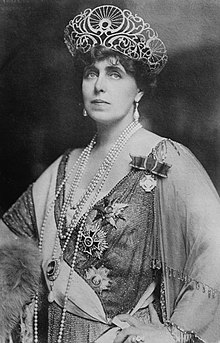Marie of Edinburgh, Queen of Romania
| Marie | |||||
|---|---|---|---|---|---|

Marie wearing her regalia. Photograph by George Grantham Bain.
|
|||||
| Queen consort of Romania | |||||
| Tenure | 10 October 1914 – 20 July 1927 | ||||
| Coronation | 15 October 1922 | ||||
| Born |
29 October 1875 Eastwell Park, Kent, England |
||||
| Died | 18 July 1938 (aged 62) Pelișor Castle, Sinaia, Romania |
||||
| Burial | 24 July 1938 Curtea de Argeș Cathedral |
||||
| Spouse | Ferdinand I, King of Romania | ||||
| Issue | |||||
|
|||||
| House | Saxe-Coburg and Gotha | ||||
| Father | Prince Alfred, Duke of Edinburgh | ||||
| Mother | Maria Alexandrovna of Russia | ||||
| Signature | |||||
| Full name | |
|---|---|
| Marie Alexandra Victoria |
Princess Marie of Edinburgh, more commonly known as Marie of Romania (Marie Alexandra Victoria; 29 October 1875 – 18 July 1938), was the last Queen consort of Romania as the wife of King Ferdinand I.
Born into the British royal family, she was titled Princess Marie of Edinburgh at birth. Her parents were Prince Alfred, Duke of Edinburgh and Grand Duchess Maria Alexandrovna of Russia. Marie's early years were spent in Kent, Malta and Coburg. After refusing a proposal from her cousin, the future King George V, she was chosen as the future wife of Crown Prince Ferdinand of Romania, the heir apparent of King Carol I, in 1892. Marie was Crown Princess between 1893 and 1914, and became immediately popular with the Romanian people. Marie had controlled her weak-willed husband even before his ascension in 1914, prompting a Canadian newspaper to state that "few royal consorts have wielded greater influence than did Queen Marie during the reign of her husband".
After the outbreak of World War I, Marie urged Ferdinand to ally himself with the Triple Entente and declare war on Germany, which he eventually did in 1916. During the early stages of fighting, Bucharest was occupied by the Central Powers and Marie, Ferdinand and their five children took refuge in Moldavia. There, she and her three daughters acted as nurses in military hospitals, caring for soldiers who were wounded or afflicted by cholera. On 1 December 1918, the province of Transylvania, following Bessarabia and Bukovina, united with the Old Kingdom. Marie, now Queen consort of Greater Romania, attended the Paris Peace Conference of 1919, where she campaigned for international recognition of the enlarged Romania. In 1922, she and Ferdinand were crowned in a specially-built cathedral in the ancient city of Alba Iulia, in an elaborate ceremony which mirrored their status as queen and king of a united state.
...
Wikipedia
